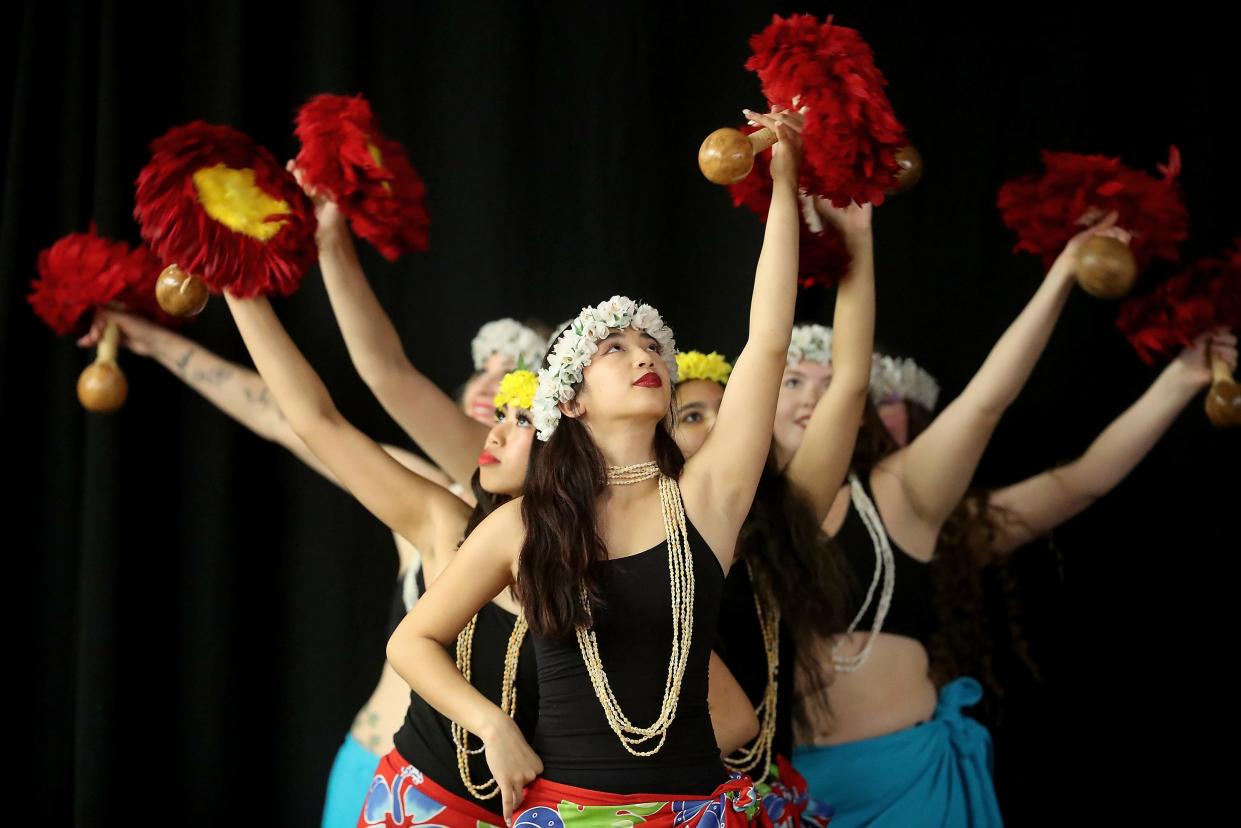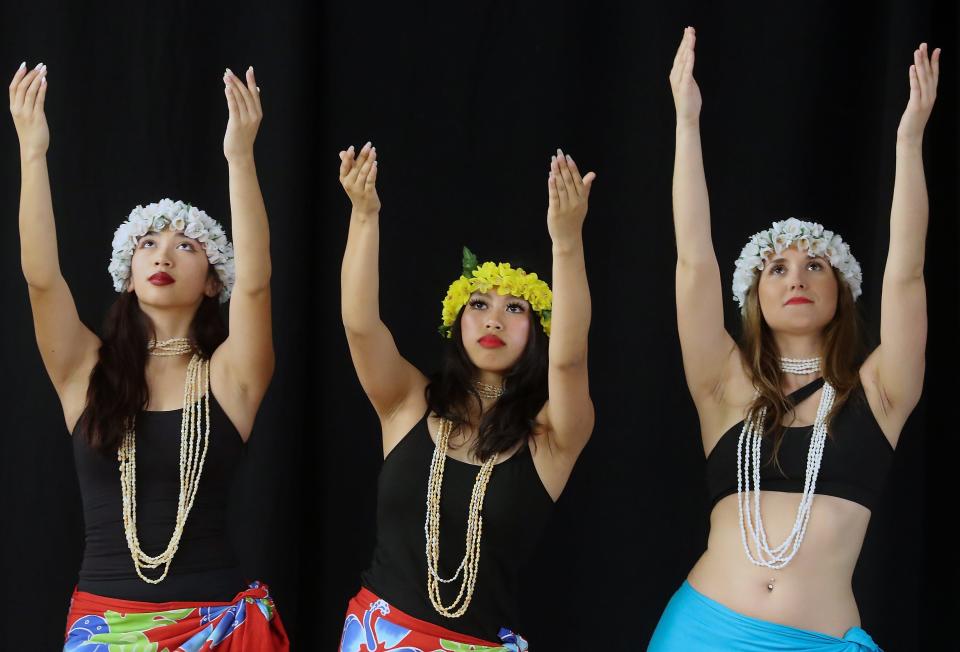Nonprofit focused on Pacific Islander students and culture, now looking to grow in Kitsap

Keion Clark met Patrick Woo-Ching during his lunch period, when he followed his friends up to a third-floor classroom at Bremerton High School. Woo-Ching, affectionately referred to as Uncle Patrick by the students, is the executive director of Voices of the Pacific Island Nations (VOPIN) and face of the grass-roots organization working to remedy educational inequalities for Pacific Islander students.
Clark, who is of Filipino and Black heritage, immediately found a welcoming community among Woo-Ching and his peers in VOPIN after moving to Bremerton half a year ago. Soon after, he found himself in the heart of VOPIN’s mission.
The nonprofit was founded in 2015 in response to the academic underperformance of Pacific Islander students across Washington State. The issue was flying under the radar.
Asian Americans and Pacific Islanders have been historically grouped together by federal agencies in statistical data and discussed as one monolith.
This aggregation skews results when it comes to academic achievement, Woo-Ching said. When the higher scores of Asian Americans were averaged with those of Pacific Islanders, it created a false representation of the latter group’s academic standings. As a result, Woo-Ching saw the educational and cultural needs of Pacific Islanders, who were struggling in school, falling through the cracks.
In 2022, Pacific Islanders had a 77.9% graduation rate in Washington Schools, as compared to the 92% among Asian Americans, reported Results Washington.
Poverty has proven to be an obstacle for Pacific Islander students’ academic success, said VOPIN grant writer Eliza Evans.
“A number of the students that we work with are homeless and food insecure” Evans said. “As soon as they can get a full-time job at 16, they're dropping out because they have to work.”
The poverty rate among Pacific Islander children under 18 was 22.7% in 2021, reported the Economic Policy Institute, and the dropout rate for Pacific Islanders was 7.6% the same year, according to the national Center for Education Statistics.
In addition to higher poverty rates, Pacific Islanders struggle with language barriers, cultural differences in class that disconnect them from Western teaching styles and low participation from their parents who don’t know how to advocate for their students, Evans said. Pacific Islander boys are also hindered by high discipline rates because they are stereotypically perceived to be physically intimidating and aggressive.
“Those differences bring our students to the level where they don't see themselves as being heard,” Woo-Ching said. “It's very difficult for our Pacific Island students to ask for help.”
It’s easy for students to feel discouraged when students experience racial discrimination and don’t see their cultural values reflected among their peers, Woo-Ching said. “They don't feel welcome in the education environment."
Tutoring first step to supporting students
During Clark’s first interaction with Woo-Ching, he filled out a form to participate in VOPIN’s mentor and tutoring program.
“There are three things in our strategic plan and that's youth development, family services, and arts and culture,” Woo-Ching said. “It's important to them that they know their heritage and the history and where they come from, because that really puts a whole new energy in the way they view themselves, how to move forward with their education and their goals.”
The first step that VOPIN has been able to establish so far, is their tutoring program at Bremerton High School. There, Woo-Ching and VOPIN volunteers serve about 50 students from more than just Pacific Islander backgrounds.
“The more I got to know everyone there, the more I stuck around for tutoring,” Clark said. “The way Mr. Patrick put it, the Islander community is really struggling in math. I'm already done with all my maths. I finished algebra, algebra II, geometry, I just got done with financial fitness.”
So, Clark decided to and offer his tutoring support for his fellow students.
“There's only one teacher, and one teacher might have 20 or more kids and they might not be able to get to every kid,” Clark said. “It's so hard to get tutors and the teachers might come after school and try to help, some may not. It's very inconsistent. And when you go during lunch, you only have 30 minutes. And then you have VOPIN – it's easier access after school every Wednesday, it's consistent.”
Though tutoring is only the first step towards VOPIN’s larger goal, success stories are starting to roll in.
“We are making some great strides toward improving education outcomes and academic achievement for Pacific Islander students in Kitsap County,” Evans said, mentioning that VOPIN has supported students who weren’t on track to graduate, all the way through to college and job applications.
“We're seeing more and more students participating in the program,” Woo-Ching said.
Clark has begun to intern for VOPIN, hoping to give back even more to the community of students that made him feel welcome.
“Even though I'm Filipino, the people I hang around who are brown, they treat me like I'm their brother,” Clark said. “I have a community behind me who has my back and they'll help me through homework or even non-related stuff and I'll do the same for them… This school year, that's what I plan on doing; helping my peers, helping the community, doing as much as possible.”
Central Kitsap School District has begun conversations with VOPIN about their program and options for funding such as partnering for grant applications, said spokesman David Beil.
“If we are able to secure a grant or other funding source, we would most likely work with VOPIN to hire staff that would tutor and mentor students,” Beil said. “Additional partners and caring adults that help support, tutor, and mentor our students can help us ensure that all students have the chance to succeed, regardless of background, identity, or family income.”

Building community through culture
Tutoring is only the first of VOPIN’s hopeful three-pronged approach to educational inequity, but further service requires funding.
On August 12, the organization hosted its first fundraiser – a lūʻau at the Clearwater Casino with tickets, a silent auction, a performance by Sunshine from Polynesia and a dance party.
“The isolation caused by the pandemic has been I think especially hard on people for who community is a big part of who they are,” Evans said. “It's about bringing the community back together.”
In further efforts towards building community, VOPIN aspires to expand their support for Pacific Islander students and their parents with an arts and culture department.
“We're working on creating a really solid staff base so that we can bring that in and then start making the connection to how the students see themselves, because right now, they feel like there is no space to share their culture,” Woo-Ching said. “That's the opportunity for the parents to get engaged in their children's learning.”
VOPIN has a long-term vision of creating a community center where students and families could practice their culture with hands-on learning like weaving baskets, taking language classes and listening to stories from elders through whom students can get in touch with their cultural values, Woo-Ching said.
“Engaging youth in their culture so they understand their culture, their history, their ancestry, and their cultural values, that improves their resiliency,” Evans said. “It sets them up on a much better trajectory in terms of the future, and then they become the culture bearers for the other generations.”
Because there is such a wide diaspora of Pacific Islander identities, VOPIN’s community center would be a place to experience one another’s cultures, Woo-Ching said.
“I'm looking forward to knowing a little bit more about my culture, but I get to learn about other people's culture,” Clark said. “Even though we're a little different, we’re sort of similar at the same time.”
There are many pockets of Pacific Islander communities around Kitsap County, in churches, hula instructors and language classes, Evans said. “We want to build a bridge to bring everybody together.”
Further down the road, VOPIN hopes to create a network of care for students through referral agreements with different organizations around Kitsap County specializing in behavioral health, primary care, dental, housing and education, Evans said.
But for now, the nonprofit’s major obstacle is funding, Evans said. VOPIN only has one full-time position in Woo-Ching and one part-time worker. The rest are volunteers.
“We have a lot of the people to do the things: we have musicians, we have dancers, we have artists, but everybody has to make a living,” Evans said. The organization’s funding is “primarily grants which is fantastic, but we don't have anything currently that we can do, like fees for service.”
Evans and Woo-Ching hope cultural events like VOPIN’s lūʻau fundraiser will begin to establish a support base.“The more we learn about other cultures, the more invested we are in making them a part of our community and supporting everyone,” Evans said. “In order to do that in a respectful way, we have to understand all of the cultures that are around us and that are part of us.”
This article originally appeared on Aberdeen News: Pacific Islander students the focus of nonprofit looking to grow

